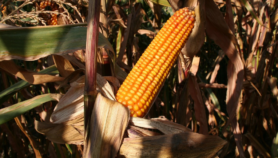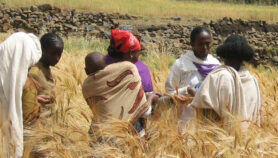By: Jennifer Thomson
Send to a friend
The details you provide on this page will not be used to send unsolicited email, and will not be sold to a 3rd party. See privacy policy.
Africa must be free to explore the potential of agricultural biotechnology without undue European influence, says Jennifer Thomson.
African Union leaders took an important step in acknowledging the potential of biotechnology to help agricultural development earlier this year when they endorsed the Freedom to Innovate plan. The plan emphasises the need for Africa to find a unified approach to agricultural biotechnology research and biosafety regulation.
But while the plan represents enthusiasm for biotechnology at the continent’s highest levels, Africa’s ability to effectively implement it on the ground remains to be seen. Much will rely on how national governments and their electorates perceive key technologies or products, such as genetically modified (GM) crops.
Many Africans — scientists, politicians and farmers alike — recognise the need to support any technology that will help feed the continent’s poor. But in Europe people often throw their hands up in horror at the idea of growing or consuming GM crops.
Europe should not pontificate on what is good or bad for Africans — we can do this for ourselves.
Still, many African leaders unfortunately look to Europe for advice, as this is where our greatest export markets lie. When they see Europe turning its back on GM crops they can assume there must be something seriously wrong with them. What Europeans say matters on our continent — they should think carefully before speaking out against GM crops.
Notches on the GM belt
GM crops have already started to make a difference in securing food supplies and alleviating poverty across Africa. Engineering key crops to be insect or virus resistant has led to a decreased use of agrochemicals, increased yields and higher returns — for commercial farmers and smallholders alike.
Maize is one of the most important sources of calories for Africa’s poor, as well as being a key crop for cattle feed. But it is susceptible to damage from parasitic weeds like Striga, viruses such as the maize streak virus (MSV) and pests — stem-boring insects cause significant yield losses of 15–40 per cent in Africa and can even result in total crop failure if conditions favour infestation.
Biotechnology can help insure against such losses. In South Africa, ongoing glasshouse trials for maize engineered to resist MSV have provided encouraging results for creating commercial varieties.
Similarly, field trials in Kenya using a non-GM variety of maize resistant to the herbicide imazapyr — effective against Striga — have proven very successful.
Striga infests as much as 40 million hectares of smallholder farmland in sub-Saharan Africa, affecting the livelihoods of over 100 million people and causing annual crop losses estimated to be worth US$1 billion. The weed attacks crop roots and is almost impossible to remove through conventional weeding techniques.
Coating maize seeds in imazapyr, though, is an effective way of killing the weed without impacting the crop’s health. The Kenyan field trials have reported yield increases of 38–82 per cent compared with traditional varieties.
Commercial farmers planting insect-resistant GM maize in South Africa have also seen an increase in their yields. This has led to rising incomes — with net gains ranging from US$24 per hectare in dryland areas to US$143 in irrigated regions — despite the higher costs associated with using GM seeds.
Success on the small scale?
Could small-scale farmers also benefit from planting GM maize for home consumption? In theory, GM maize could help small-scale farmers ensure a steady food supply for themselves while simultaneously increasing yields and providing their families with a previously unavailable source of income.
But with such a large difference in price — GM seeds cost $83 per kilogram compared with $52 per kilogram for conventional seeds — the answer is probably no, unless the farmers already buy non-GM hybrid seeds from seed companies each year.
Still, only ten per cent of small-scale farmers currently use hybrid seeds across Africa as a whole, although the figure is much higher for some individual countries — 85 per cent in Kenya, 65 per cent in Zambia and 91 per cent in Zimbabwe.
Only time will tell if the benefits associated with higher yields overcome the higher cost of GM seeds for small-scale as well as commercial farmers.
In the case of cotton, the benefits of GM varieties to small-scale farmers are more obvious. Insect attack is one of the major constraints to cotton cultivation worldwide, with yield losses worth an estimated US$5 billion annually. Approximately 25 per cent of all insecticides used in agriculture are applied to cotton — more than any other crop. In some Central and West African countries, this figure can reach staggering levels — as high as 80 per cent.
UK scientists from the University of Reading have been weighing the economic costs and benefits of insect-resistant Bt cotton in South Africa for a number of years. Seeds for this crop were commercially released in 1997 and have since been extensively used in KwaZulu-Natal province where, by 2001, 90 per cent of all farmers were growing GM cotton.
Many of the traditional insecticides used here are highly toxic. By switching to GM cotton, small-scale farmers in the region have lowered risks to their own health and decreased the levels of chemical insecticides entering the local environment. Smallholder farmers in this region have also received a 77 per cent higher return on GM cotton.
An African action plan
The UK scientists found that, in general, the smaller the farm, the greater the benefits in terms of higher income received.
But, as the authors note, GM cotton is not a silver bullet that can solve poverty among these farmers overnight. Efforts must be made to improve soil conditions, road and rail infrastructure, and educate farmers to help them implement best agricultural practices.
Still, GM technology holds much promise for improving the lot of African small-scale and commercial farmers alike. The continent’s leaders should be applauded for their recognition of this potential in their endorsement of the Freedom to Innovate plan. But now they must be given the freedom to implement the plan without fear of undue criticism from European sceptics.
Jennifer Thomson is a professor of microbiology at the University of Cape Town in South Africa.













